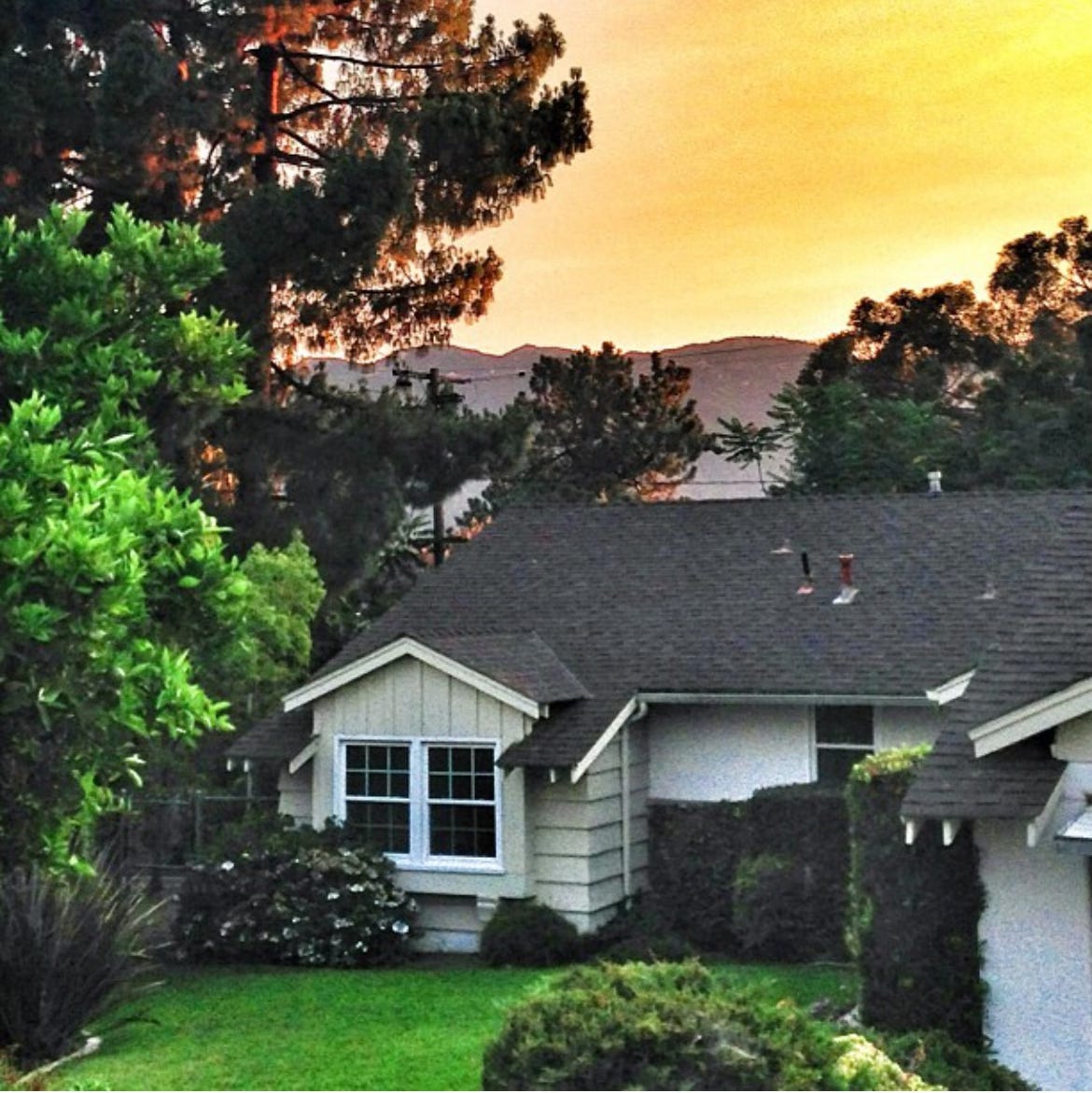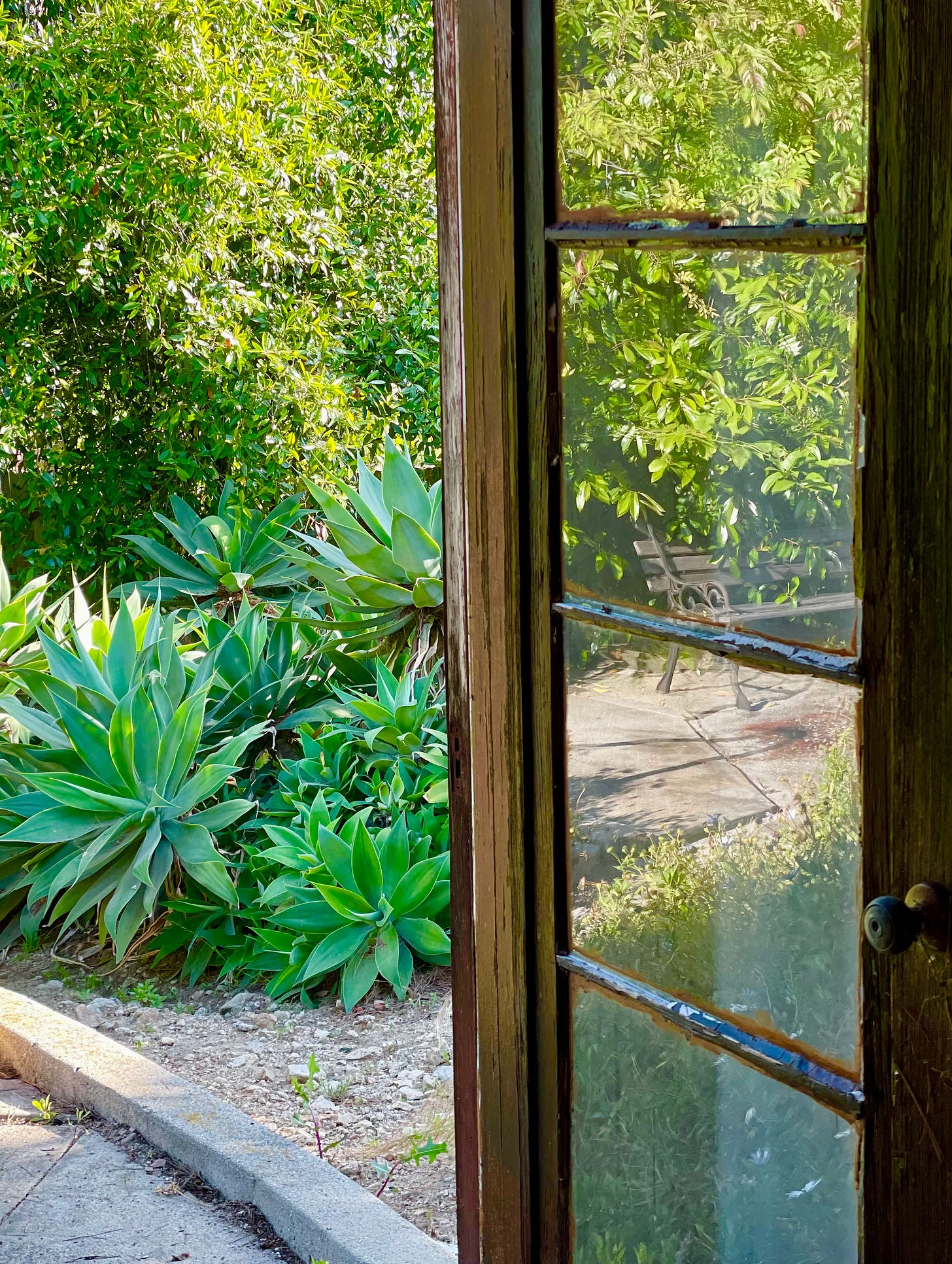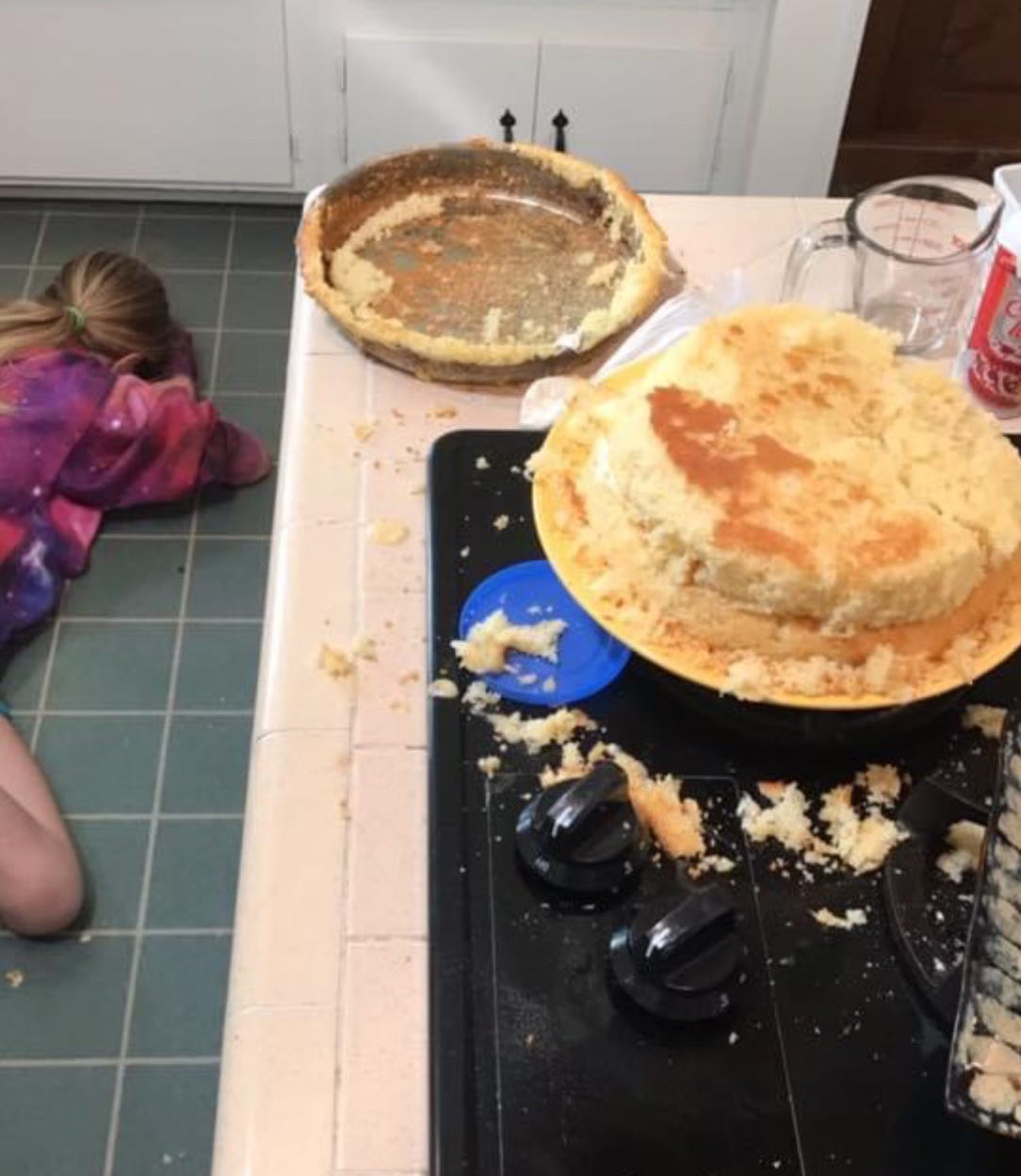The House That Built Me
On homes and pilgrims and falcons and the unique pleasure of smashing a cake.
In the span of one year, I lost almost everything. I lost, among other things, my mom, my cat, my house, my job, my sister, and my stepfather. I lost part of my identity as a mother, and most of my identity as a daughter. I lost my sense of fixedness in the world; I lost my experience of the world as a stable and more or less predictable place. It was a lot. I am still reeling, and I am also checking the calendar to make sure that my measure of one year holds. I am hoping that The Universe, having visited a year of loss upon me, is going to keep it more or less to a single year and dole out future losses at a more expansively measured pace. I am knocking wood as I write that.
I have had other years of losses, of course; once you get to a certain age, loss is inevitable. The year that I lost my dad was a heart-crushingly terrible one. So was the year that I lost the start-up that I founded, the one that I’d left my fancy job at The Walt Disney Company to build. That year also happened to be the year that my dear nephew Tanner died; fielding urgent Slack messages while standing at his graveside was the catalyst for being willing to lose that start-up, as it happens. All years in which big losses occur feel like bad years, and they are bad years, but they are also just part of life, and sometimes they’re the parts of life in which you learn the most. But other years were paced apart, and dealt out only one or two body-blow losses apiece; this past year was just a fucking rockslide of what felt like massive, soul-rattling losses, one after the other. If I’d only lost my mom it would have been a devastating year, but her loss was just the worst in an onslaught of losses that just did not let up.1
Anyway. One of those things was my house. My home. There have been very few places in my life that I have not only called home but felt in my bones to be home, and this was one of them. We moved around a lot when I was a kid and I never lived in any one house or neighborhood for longer than three years, a pattern that followed me fully into adulthood right up until we moved to Los Angeles. I’ve lived in this house longer than I have ever lived anywhere in my life, and even though I never expected to live here for such a long time, I did, and that matters.
I am using the present tense, because I am still in this house, this home-soon-not-to-be-home. We give it up at the end of this month, which feels terrifyingly imminent and also an eternity. We’ve lost it for the most mundane of reasons: we have been renting for eleven years, and the owner has decided to sell. This was an inevitability, of course — the house was his mother’s (our original landlady), and she died, and it was only going to be so long that this lovely piece of Los Angeles real estate would remain undercapitalized. We’ve anticipated this since she passed away, and had vague plans to address it, but LA is expensive and life is life-y and the prospect of trying to figure out a new home felt, you know, daunting. We raised our kids in this house, and we still have one of them in the local school system, so leaving the neighborhood (a neighborhood that is well beyond our ownership reach) was not something that we were rushing to do, especially not in a hell year when everything was turning upside down. When the call came some weeks ago, we were not exactly surprised, but it was a gut punch. A hard one.
It’s a loss, a big one, and I include it in the chain of losses over the last year because like many of those other losses it is reshaping the entire landscape of my life. It is altering the horizon, and the pathways toward that horizon, as well as the trails that I’ve already traveled. It is making me rethink everything, not least the question of what is home. Is home where you’ve lived the longest? Is it where your fondest memories were formed? Is it where your loved ones are? Can it be more than one place? Does it matter if the place that you call home is a borrowed place, a place that belongs to someone else? How does one wrap her heart around homemaking, in the sense of making a new place into home? Can temporary, borrowed places be home?
The origin of the English word ‘home’ derives from, among other sources, the Old English word ham, which means a place of dwelling or fixed residence. Fixedness is core to the meaning that we ascribe to the idea of home: a home is distinguished from a house because it is a place where someone anchors their life, makes their life. The Greeks used one word, oikos, to refer to both house and to family,2 or household: the place of the household was, simply, the house. But there’s a similar sentiment at work: the place where we make our life is much more than a building or structure. It’s not the walls that the make the home or the household, it’s the lives that are lived therein. And oh, we did make such a life in this house that we are losing.
People buy those terrible shiplap-engraved signs that say Live Laugh Love and put them on their walls for a very human reason: living, loving, and laughing is what we all hope to do in the houses that we inhabit, because those are the things that make a house a home. So are arguing, crying, grieving, worrying, and the like; I once tore into my mother at our kitchen table while she was visiting, on a point of contention that felt absolutely vital at the time, and that I would still defend even if I regret raising my voice and assigning a painful memory to that table, that room (does everyone regret ever being angry at a loved one after they’re gone? I wish that I could undo all of the times that I was angry at my mom, even the times that I was in the right. I hate that I ever raised my voice to her, even though those were few.) Emilia once flew into a rage in that same kitchen over a failed attempt at baking a cake, and literally flung herself to the floor, sobbing, before getting up and pummeling the failed cake with her fists until it was dense punched-up mash.3 Perhaps the kitchen is the heart of the home because it is where we are most likely to laugh and to fight, sometimes all in the same hour. We spent eleven years living, laughing, loving, raging, dreaming, worrying, playing, and crying in this house that we have lost. This home.
We have found a new home, which is a story in itself, a more or less fairy tale type of story that deserves its own narrative attention. Suffice to say for now that it is a gift, a soul-saving one that is no less soul-saving for being liminal — for being a way station between the home that has been and the home(s) that will be, and itself a true home despite the fact that it will be temporary. The move into this new transitional fairy tale home will, I think, answer some of those questions that I raised above about how we make home on landscapes of uncertainty, how we author our own belonging in spaces of transition. I won’t begin to uncover those answers until we are fully there.
I was going to end this post with the photo above. But as I was writing this, one of my very best friends in the world messaged me, and brought up home in the context of what the Welsh call hiraeth.4 We are doing a pilgrimage together at the end of this summer and the logistics are somewhat beastly and requiring ongoing discussion, but we’d lapsed in such discussion for a few weeks because of the distractions of grief and other emotional turbulences. We were texting about the grief-lapse and the pilgrimage, and he said, I think we are displaced and looking for a home. I said, well, we are pilgrims, in all senses.
The word ‘pilgrim’ comes from the Latin peregrinus, which itself comes from the words per (through) and ager (field). Peregre is usually translated as ‘abroad,’ but I prefer it as ‘over yonder,’ ‘across the way,’ or literally ‘through the field,’ because those better capture the spirit of journeying that I think is inherent in the term. A peregrine falcon is literally a pilgrim falcon, a falcon from somewhere over there, from the other side of the field; the pilgrim falcon is a falcon who is always journeying. Peregrinating. The thing about peregrinating/pilgriming is that it doesn’t focus upon a final arrival point; it’s about the movement itself. The peregrine falcon never arrives at a place with the intent to stay permanently; the pilgrim, if we’re going to be pedantic about it, isn’t so much seeking a destination as she is earning her way toward some spiritual benefit (enlightenment, revelation), even if that benefit involves a destination (entry into heaven/avoidance of hell). It’s not being there, it’s getting there. The journey is the point.
It’s all way stations, in other words; never homes. Journeying is by its very nature a process of being intentionally and persistently not-at-home. We could get poetic about it and say, oh, but isn’t the point to become at home in the world or at home in the soul, and yes, sure, I think that’s right but also I don’t because part of me thinks that the real point of journeys is to understand ourselves and each other outside of spaces of security.5 And that’s precisely why it can be so tiring to feel at a loss with respect to home: when one is away from home, lacks a home, feels alienated from home, has intentionally set out from home, one is in a state of insecurity. And being in a state of insecurity, whether or not one has chosen it, is exhausting.
All of which is to say: even the most committed pilgrims get tired of wandering, and I am not a committed pilgrim. I might journey and wander and seek and do all of the things that pilgrims and 20-something backpackers do, but I also long for home. I had a home, I have had homes, and I am looking forward to finding my next home. Perhaps it will be this temporary one, and will be no less home for being temporary. I will discover that when I get there.
Losses, and weirdnesses, and at least a couple of beautiful if emotionally dense things. There were two weddings — one of which I officiated, two and a half months after my mother died — a heart attack scare, a breast cancer scare, the passing of a longtime friend (which death I was informed of while planning the logistics of my mother’s impending death), seeing one kid leave home for college, and an assortment of other highs and lows of the more or less ordinary and extraordinary varieties. It was a shitshow of a year with a scattering of concentrated light. I will be recovering for a long time.
Oikos is also the root of the word economy — oikonomia, or management of the household, which came to mean management of resources in general, or economics as we know it, mostly.
Industrious creature that she was (and still is), she proceeded to take the punch-mash and turn it into mug cakes. “Punch Cakes,” we called them. A masterclass in baking economy.
I almost got through this post about longing for home without referencing hiraeth, which has been excessively memed on social media, an excess that I have participated in, because it is such an evocative word, usually understood a kind of homesickness or longing for a familiar place to which one can never return. A kind of grief, like the Portuguese saudade, a deep melancholy in longing for something, someone, or somewhere.
At Disney I used the term ‘architectures of reassurance’ to describe experiences of security when they weren’t related to space or place (stories can create or provide architectures of reassurance); I became adept at making corporate-friendly arguments for the Disney brand as an architecture of reassurance. My above-mentioned best friend Michael introduced me to the term, which he discovered in a book that was created to accompany an architecture conference in Montreal on the topic of Disney’s theme parks. If you have had more than a few conversations with me you will have heard me say ‘arCHItectuREs oF reASSuraNCE’ at least once; I can work it into literally any conversation, this post included.






Baking can be a ruthless teacher.
Wishing you comfort in welcoming walls and the unfamiliar ways of daylight in your new perch.
This makes me think of the song This Must Be the Place by Talking Heads (and covered beautifully by Shawn Colvin). All of the lyrics are about finding home, this is just one example:
“I'm just an animal looking for a home, and
Share the same space for a minute or two”